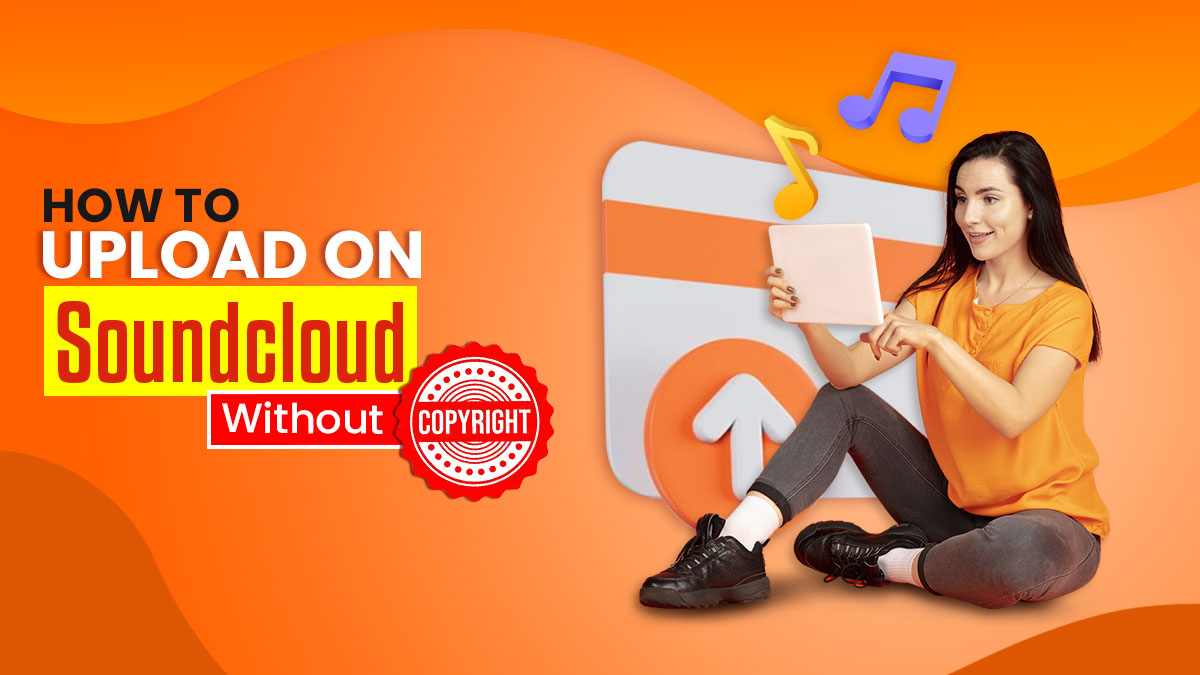
SoundCloud is one of the biggest audio streaming platforms on the internet and getting viral can grab a big opportunity for musicians to shine in the music industry. The more streams any artist has on the streaming platform, the more famous they are, and the more gigs and opportunities they will get. So if you are a singer who aspires to become a famous musician one day, it is time to focus on SoundCloud and start uploading. Now the problem is uploading anything might be challenging due to copyright issues. And you are not alone in this, many artists face copyright issues while uploading any track or sound on streaming services, especially SoundCloud. So how do you do that without copyright infringement? Let's get to that.
How to upload music on SoundCloud without any Copyright issues?
SoundCloud is like a social media platform for musicians and artists where they can showcase their talent, get followers, and streams, and get recognition. The platform also gives an opportunity to reach a much wider audience pool. However, while uploading on SoundCloud, you must be aware of the copyright laws and avoid infringing on the rights of other artists. Here is a comprehensive guide to avoid copyright issues.
1. Original music - The first step to avoid using anyone else's music and getting notices on SoundCloud starts with crafting completely original music. Yes taking inspiration from any tune or sound is okay but the composition should be completely original and self-created. This is one of the best ways to make sure you are not infringing on someone else's copyrighted material.
2. Understanding the basics of copyright - Before you know how to avoid copyright infringement, it is important to understand the very basics of it. Copyright starts with the basics of when someone creates anything original, they have the only rights to them. Copyright works on everything, starting from music composition, lyrics, or any other type of content. The same rule applies to music artists as well, when a musician creates an original musical piece, they automatically own the copyright to it. This ownership grants the creator the exclusive rights to perform, distribute, and reproduce the work.
3. Royalty-free music - If you want to use someone else's music on your track and want to upload it on SoundCloud, make sure the music is royalty-free. Royalty-free music is when music is licensed in a way that allows other musicians to use it without paying for the royalty or any other additional permissions. You will find royalty-free music on various platforms and websites on the internet that you can use for your SoundCloud uploads. This will keep you away from any copyright infringement or paying for any royalty.
4. Get proper licensing - If there is one piece of music that is a must-use in your track, and it is copyrighted, getting proper licensing is the only way to move forward. Find out who the original creator is and obtain proper licensing to use their music. The process might be even bigger than just finding out who the original creator is. It might involve contracting the recording label, the publisher, and the artist directly to make sure you have the necessary permissions.
5. Public domain - One way to make sure you are not hampering anyone's copyrighted work is by understanding how the public domain works. You can use any audio content or classical music that is available in the public domain. This means the copyright term for the song or audio is expired and can be used freely by anyone.
6. Understanding Fair Use - Fair use is a legal doctrine that allows others to use copyrighted music or work without permission, but it must be limited. Fair use includes purposes like criticism, comment, teaching, scholarship, news reporting, or research. Using Fair Use requires the person using the copyrighted material to use a disclaimer. However, the rules of fair use are complex and vary depending on which jurisdiction you are in. So before you start to rely on Fair Use, make sure you understand the complexities of it completely.
7. Creative Commons (CC) - Getting Creative Common licenses allows artists to share their musical work without making specifications about the terms of use. You will find plenty of Creative Commons-licensed music, allowing you and other artists to remix, or upload the music under certain circumstances. Some artists use their Creative Commons licenses to release their music so that it can be used for remixes or sampling, as long as they follow the license's conditions. So make sure to comply with the terms and rules that are specified in the license.
8. Avoid sampled content - If you use sampled content from copyrighted music in any of your uploaded, you can encounter great challenges regarding copyright issues. Even if you create an original musical piece, but use copyrighted samples to do so, it could still, very well, be considered copyright infringement. So make sure every element in your musical upload is either completely original, something that you have created on your own, or properly licensed.
9. SoundCloud’s copyright policies - As one of the biggest audio streaming platforms on the internet, SoundCloud has very strict copyright policies. The platform uses smart search engines to detect any kind of copyright infringement. If your song is considered copyrighted, it can get removed, and your profile could get shadowbanned from the platform, slowing down your reach. So before you upload any musical piece on the platform, make sure you are familiar with SoundCloud’s copyright guidelines and only upload when your music meets all the requirements.
10. Proper credit - If you are suing anyone else's copyrighted music or sound, or using any CC-licensed material, always give proper credit. Basically, if you are using any kind of content that is not completely yours, and requires attribution or credit, ensure to provide it accurately. When you give credit to the original creators, it helps demonstrate that you are in accordance with fair use, or using the content with permission.
Remember, uploading music with copyright issues can get your account banned on the platform and even take you into legal matters.



Left Hook Blue Kick-starts 2026 With 'The Flood'

Why Your Video Isn’t Getting Views Even After Uploading Consistently

Music Promotion Club Provides Reliable YouTube Promotion Services for New Channels of Artists

What Are the New 2025 Algorithm Updates On YouTube and How to Adapt Them?